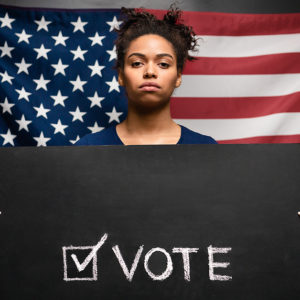As a woman and constitutional lawyer, I have long held special reverence for the 19th Amendment.
Ratified 100 years ago (Aug. 18, 1920), this critical addition to our Constitution helped remedy a gap in our nation’s charter by protecting the right to vote against sex discrimination at the ballot box.
This reinforced the status of women as equal citizens in America — an equality that includes the right to stand for election, and win, just as men can.
Make no mistake, the struggle for women’s equality in our democracy began before our nation’s founding, and it continues to this day. Four years ago, a woman ran for president and won 3 million more votes than the man who now sits in the White House.
This year, the nation will have the opportunity to elect a woman — the daughter of Jamaican and Indian immigrants — vice president for the first time.
Such strides are possible only after centuries of activists who worked for change, refusing to accept that women were barred from being lawyers, denied the right to vote and be voted for, and generally unable to enjoy the liberty, independence and respect that true equal citizenship demands.
The road to securing the right to vote free from sex discrimination, however, has hardly been a straight one. For example, while the woman’s suffrage movement showed interracial camaraderie among early activists who understood the unbreakable linkage between sex and race in the fight for equality, that cooperation faltered after the Civil War.
In the Jim Crow era, the advancement of Black women was sacrificed to a strategy that focused instead on the interests of middle-class and wealthy White women, with the movement “turn(ing) its back on women of color,” as Black suffragist Coralie Franklin Cook put it.
As Brent Staples discussed last year, the 19th Amendment’s promise remained unfulfilled for millions of Black women, especially those in the south, for almost five more decades.
They, along with their families, were blocked by racist state governments and terrorized by racist mob violence from exercising their right to appear at the ballot box and cast their votes like any other American citizen.
This constitutional story — of “two steps forward and one step back” — is a distinctly American one, a story we have told ourselves since the constitutional convention in Philadelphia.
We established the most radically democratic constitution the world had ever known, yet we cut more than half the population out of its protection — consigning millions of African-Americans to the brutality of chattel slavery and treating women as “merely appendages to their husbands.”
After a bloody Civil War, we amended the Constitution to guarantee birthright citizenship and equal protection of the laws, and to protect the right to vote for Black men. Once again, however, the rights of women — Black and White — were left behind.
Still more struggle by countless activists, many of whom remain unknown to history, was required over generations to pull our nation ever closer to its founding ideal, that all of us are created equal.
Ratification of the 19th Amendment was followed by enshrining the 24th Amendment, prohibiting poll taxes, into the Constitution. And 100 years after the Civil War, the Civil Rights Act of 1964 and the Voting Rights Act of 1965 were passed into law, enforcing equality in public accommodations, the workplace, and at the ballot box.
Here in 2020, we are still fighting to ensure full voting rights for every American. And yes, we still see how the intersection of race and sex discrimination conspire to keep Black and Brown women from voting.
Many state governments, virtually all of them run by Republican officials, have taken their direction from Chief Justice John Roberts, who wrote the 2015 Supreme Court ruling in Shelby County v. Holder. That ruling gutted the Voting Rights Act and gave the green light to officials eager to enact a raft of voter suppression laws that disproportionately harm women and men of color.
This year — in the wake of the police killings of George Floyd, Breonna Taylor and so many others — the nation is rising up like never before to declare that Black Lives Matter.
As we celebrate the centennial of the 19th Amendment during this election year, we must also declare that Black Votes Matter — and that the votes of Black women, in particular, matter.
We the People must do the hard work of ensuring that their votes can be cast free from discrimination, removing barriers to the polls, and guaranteeing that all of their votes will be counted.
Our Constitution demands nothing less.

